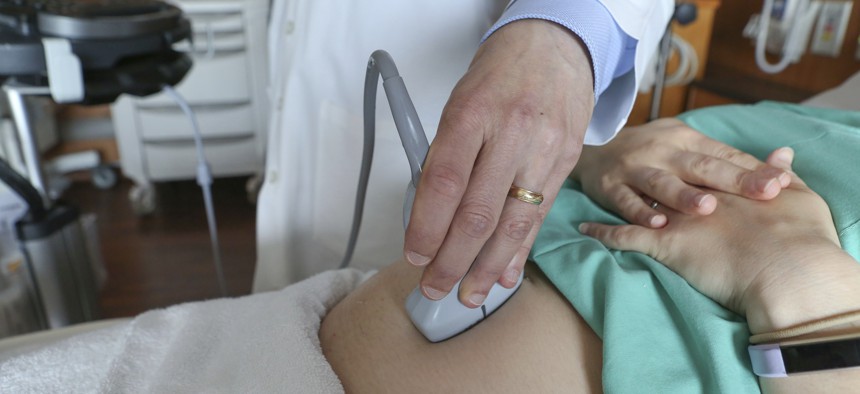A New Bill In Pennsylvania Would Require Burial of ‘Fetal Remains’

A doctor performs an ultrasound. Under a Pennsylvania bill, fetal death would be defined as any time after conception. Teresa Crawford/AP
The bill mirrors several others that have appeared in state legislatures across the country.
A Pennsylvania bill that recently passed the state House would require health care providers to cremate or bury fetal remains unless a parent chooses to do it themselves.
The "Pennsylvania Final Disposition of Fetal Remains Act" redefines the concept of “fetal death” to mean the loss of a fetus at any point in pregnancy after conception. Reproductive rights activists say the requirements of the measure create unfair mandates on health care providers.
The bill, which follows an Indiana law that the U.S. Supreme Court upheld earlier this year, would apply to abortions and miscarriages, as well as any “expulsion or extraction” of a “product of conception,” which could mean that it would apply to cases of failed or forgone invitro fertalization. Health care centers would be required to provide for a burial or cremation, a process previously only required after 16 weeks of gestation. The cost of disposal would be left to the heath care facility unless a patient decided to select their own location for the disposal of the remains.
Christine Castro, a staff attorney at the Pennsylvania-based Women’s Law Project, said that the most “radical and frightening” language in the bill is the requirement for burial permits upon fetal death. “The way it is written would require heath care providers to obtain a burial permit, and you need a death certificate for that,” she said. “You’d be requiring a death certificate for products of conception, like fertilized eggs. Inherently, a death certificate symbolizes the death of a person, so by applying it in this case, it totally disregards science and proposes the proposes that products of conception are living humans.”
In 2018, the American Academy of Family Physicians released a statement opposing the use of the terms related to “fetal personhood” in state policies because “the creation of fetal rights is in direct conflict with the constitutional rights of the pregnant person” and “the use of fetal personhood terminology in legislation has far reaching implications on the bodily autonomy of the pregnant person.”
State Rep. Frank Ryan, the Republican lawmaker who introduced the bill, did not return requests for comment. On the day of the bill’s passage through the House, Ryan told the Associated Press that the bill was meant to expand options for people who are trying to have a baby and experience miscarriages. "We wanted to craft something that was voluntary, that provided the family with the ability for closure, the ability to understand that a human life was lost, their life, that they’d been striving for for so long,” he said.
But Castro said that the language of the bill doesn’t imply a voluntary process, at least for health care workers. The bill includes jail time of up to 30 days and a fine between $50 to $300 for health care workers who don’t comply.
The language of the bill in Pennsylvania is very similar to part of an Indiana law that that the Supreme Court considered earlier this year. Georgia has a similar law, while other states have considered them. In September, Texas asked an appellate court to reinstate its law, which had been blocked by a district judge. An appellate court in Arkansas in May also asked for briefs about a law that state has on the books, which was halted by a judge in 2017.
But Castro said that the Indiana decision doesn’t mean laws requiring the disposal of fetal remains are constitutional, because the Supreme Court engaged with a “lower standard of review” known as rational basis, in which a court simply must determine if a law is rationally related to a legitimate government interest. Abortion cases are more often challenged and reviewed under the much stricter undue burden standard, which states that legislation cannot be overly burdensome on a fundamental right, she said.
“Similar laws have not withstood constitutional muster when reviewed under undue burden,” Castro said. “We can’t indefinitely say that these fetal remains mandates are constitutional. That being said, it hasn’t stopped lawmakers across the country from introducing bills like this. They’re emboldened by the change in the court.”
Anti-abortion activists have celebrated the proposed legislation, including Maria V. Gallagher, the legislative director of the Pennsylvania Pro-Life Federation. “This is a common sense bill that ensures that the remains of babies who die through abortion or miscarriage are treated with dignity and respect,” she said. “The legislation would provide peace of mind for parents who wish to see the remains of their babies buried or cremated, in accord with their wishes.”
The bill has not yet been brought for a vote in the Senate. Gov. Tom Wolf, a Democrat, has vowed to veto the legislation, should it pass.
But Castro said she is worried about merely the introduction of the bill because of the signal it sends to residents of the state. “The potential consequences of a bill like this is that it dissuades people who are experiencing miscarriages and pregnancy troubles from seeking medical care for fear of being policed,” she said. “We already see that happening. Hyper-policing pregnant people is not good for public health.”
Emma Coleman is the assistant editor for Route Fifty.
NEXT STORY: Utah Tests Ranked-Choice Voting’s Conservative Appeal






